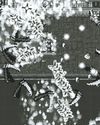
White Paper Games’ first release, Ether One, was all about the unreliability of memory. So there is perhaps irony in asking the team to take us back over a decade, when the studio’s original members were studying at Preston’s University Of Central Lancashire. As Pete Bottomley and James Burton reminisce, one event in particular stands out from the hazy mists of memory: a talk given by The Chinese Room’s Dan Pinchbeck.
Bottomley acknowledges the influence of Dear Esther, The Chinese Room’s own debut, on Ether One. After all, both are short first-person narrative games – ‘walking sims’, to use the pejorative – set in the kind of low-key British location then rarely seen in games, and both explore topics of grief and memory. This isn’t the event’s only significance, though: it was also the first time Bottomley and Burton met. So, can they remember what words they exchanged? “‘Oh, here’s your ticket,’” Bottomley recalls. “I didn’t see him for the rest of the day, and didn’t talk to him again for maybe a couple of years.”
Not quite the equivalent of that ’76 Sex Pistols Manchester gig, then – but important groundwork was laid that day. Bottomley cites the example set by Pinchbeck as an influence on the decision, when he and fellow co-founder Benjamin Hill completed their game design Masters in 2011, not to pursue opportunities in existing studios but to “do our own thing”. They began work on their first game after graduation and, by the time White Paper Games was established in 2012, had assembled a team of five, all connected through their working and living situations at UCLan. (Bottomley and Burton now teach at the university one day a week.)
Denne historien er fra April 2022-utgaven av Edge.
Start din 7-dagers gratis prøveperiode på Magzter GOLD for å få tilgang til tusenvis av utvalgte premiumhistorier og 9000+ magasiner og aviser.
Allerede abonnent ? Logg på
Denne historien er fra April 2022-utgaven av Edge.
Start din 7-dagers gratis prøveperiode på Magzter GOLD for å få tilgang til tusenvis av utvalgte premiumhistorier og 9000+ magasiner og aviser.
Allerede abonnent? Logg på

BONAPARTE: A MECHANIZED REVOLUTION
No sooner have we stepped into the boots of royal guard Bonaparte than we’re faced with a life-altering decision.

TOWERS OF AGHASBA
Watch Towers Of Aghasba in action and it feels vast. Given your activities range from deepwater dives to climbing up cliffs or lumbering beasts, and from nurturing plants or building settlements to pinging arrows at the undead, it’s hard to get a bead on the game’s limits.

THE STONE OF MADNESS
The makers of Blasphemous return to religion and insanity

Vampire Survivors
As Vampire Survivors expanded through early access and then its two first DLCs, it gained arenas, characters and weapons, but the formula remained unchanged.

Devil May Cry
The Resident Evil 4 that never was, and the Soulslike precursor we never saw coming

Dragon Age: The Veilguard
With Dragon Age: The Veilguard, BioWare has made a deeply self-conscious game, visibly inspired by some of the best-loved ideas from Dragon Age and Mass Effect.

SKATE STORY
Hades is a halfpipe

SID MEIER'S CIVILIZATION VII
Firaxis rethinks who makes history, and how it unfolds

FINAL FANTASY VII: REBIRTH
Remaking an iconic game was daunting enough then the developers faced the difficult second entry

THUNDER LOTUS
How Spirit farer's developer tripled in size without tearing itself apart